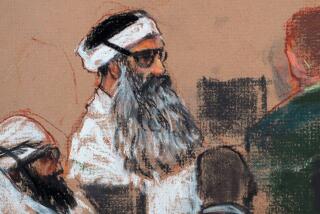Jury is out on terror suspect’s plea bargain
- Share via
GUANTANAMO BAY, CUBA — As a military judge Tuesday reviewed the specific crimes to which Australian terrorism suspect David Hicks had pleaded guilty, proponents of the Bush administration’s war crimes tribunal here hailed the plea deal as a successful start in bringing America’s enemies to justice.
In the first trial to be convened under the Military Commissions Act passed by Congress last year, Hicks decided after setbacks in the opening hours to cut a deal that would allow him to serve any additional prison time in his homeland.
The military judge hearing Hicks’ case, Marine Col. Ralph H. Kohlmann, asked the defense and prosecution for a detailed account of what actions in support of a terrorist organization Hicks was admitting to.
Once he receives that and the plea is confirmed by both sides, a panel of senior military officers will be convened to act as jury and judge in setting Hicks’ sentence -- probably guided by any pretrial agreement reached to obtain the guilty plea.
Kohlmann has given no indication of when the commission panelists will gather, but others have speculated that a sentence could be issued by the end of the week. Washington and Canberra have worked out an agreement that would allow Hicks to serve his sentence in an Australian jail, said Chelsea Martin, spokeswoman for the Australian Embassy in Washington.
Legal scholars and human rights advocates say Hicks’ de facto admission of support for the Taliban and Al Qaeda demonstrates that prisoners broken by years of mental and physical abuse see confession as the only escape route. Hicks has been held at Guantanamo for five years.
Observers criticized the plea deal as resulting from pressure brought by the Australian government, a key U.S. ally in the war on terrorism, to try Hicks or release him.
“This will be seen for what it is, which is a decision that was impacted by outside political influence and thus violated one of the most basic and minimum requirements of a fair-trial system,” said Hina Shamsi, a lawyer for Human Rights First. “If anything, this lessens confidence in the ability of the administration to get it right.”
The legal wrangling that preceded Hicks’ guilty plea exposed the paucity of legal guidance for the military commissions, which blend some elements of a U.S. civilian court and military court-martial, though they permit practices such as denying the accused the right to face his accusers, and acceptance of evidence obtained through torture and hearsay.
“How it looks depends on where you sit,” Jumana Musa, advocacy director for Amnesty International’s human rights sector, said of the outside world’s view of the new tribunal. “If you are a family in Yemen with a son here, I don’t think it looks like legitimacy.... The fact that the one white guy is getting to go back to Australia is not going to impress anyone in the Muslim world.”
Carl Tobias, a University of Richmond law professor who tracks anti-terrorism legislation and policy, said: “I think the perception at home and abroad will be that the United States did not give Hicks a fair trial and that he ultimately pleaded so he could return home. What happened does not seem to be a vindication of the process.”
Commissions officials argued that the guilty plea showed the Pentagon’s system for trying war crimes suspects worked.
“The accused used the forum to take advantage of the Military Commissions Act and to plead guilty in this forum,” said Maj. Beth Kubala, spokeswoman for the process.
The government says it could try as many as 80 of Guantanamo’s approximately 385 prisoners over the next few years. No one other than Hicks has been charged.
Human Rights Watch, which also is monitoring proceedings here, noted in its criticism of Hicks’ capitulation that Marine Maj. Michael Mori had been threatened recently with prosecution by the chief government lawyer because of statements he made criticizing President Bush’s detainee policy. Comments considered disloyal or disrespectful of the military chain of command are punishable under Article 88 of the Uniform Code of Military Justice.
The commissions’ chief prosecutor, Air Force Col. Morris Davis, had e-mailed the tribunal’s convening authority, a career Defense Department judge who functions like an attorney general, suggesting that Mori’s maligning of the commissions violated Article 88.
Mori filed a motion Monday alleging prosecutorial misconduct against Davis, accusing him of trying to intimidate the defense, but Hicks’ plea means the issue will never be aired.
The accusations of professional misbehavior highlighted the conflicting responsibilities of the military defense lawyers who are obliged to provide a vigorous defense of their client but are also part of the chain of command that includes prosecutors, judges and other court officials.
*
More to Read
Sign up for Essential California
The most important California stories and recommendations in your inbox every morning.
You may occasionally receive promotional content from the Los Angeles Times.














